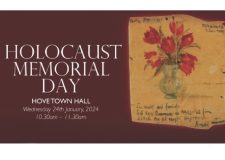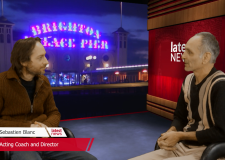Interview: Joe Bonamassa
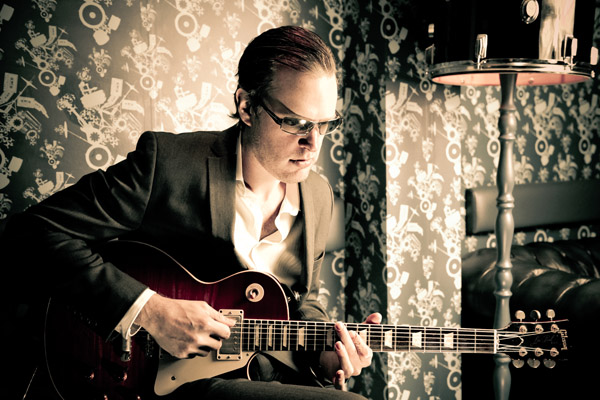
Jo B Good
The archetypal 21st century guitar hero Joe Bonamassa talks to Jeff Hemmings
“I just got back from two weeks in South America,” says Joe Bonamassa, from his home in Malibu. “The last couple of years we’ve only done about 100 shows a year, and it takes about 200 days to do 100 shows on average. The last couple of years we’ve not played during the summer, we let the kids fight it out in the mud trenches – not really a game for us! It’s a lot of wear and tear on everybody; we like to play inside venues, we know our market and our fans: ‘Joseph, we’d like a chair, please’; and, ‘we’d like it not to rain on us!’”
It’s been one hell of a journey for this master guitarist, his onstage career beginning at the age of 12 when he opened for B.B. King. As an adult he had to toil, like all the greats; from playing in dingy clubs for next-to-no paying customers, to the Royal Albert Hall and Vienna Opera House without any help from traditional record company resources. His astonishing trajectory has largely been a word-of-mouth phenomenon, with the UK playing a big part. “The UK was where it all started, where we got some traction, and set the tone for the rest of the world. Even stranger, they look at me as if I’m British! You play one gig at the Albert Hall and you’re suddenly an honorary Brit. ‘You don’t sound like you’re English’. I’m not! I’m from New York!”
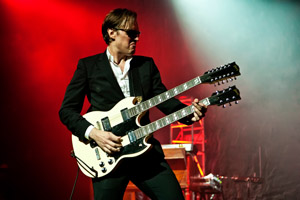
Growing up, he listened to his father’s eclectic record collection, especially loving the British blues revival sounds of the 60s. “I’ve been an anglophile, musically, for a long time. I listened to a lot of British blues when I grew up: John Mayall, Rory Gallagher, Free, Peter Green – those kind of cats. It was more appealing because as a kid it was edgier, louder, and they tended to use Marshall amps and Les Paul guitars. It was more appealing than the subtlety of American blues. Subsequently, I went back and rediscovered all our own stuff – Howlin’ Wolf and the B.B. Kings of this world.”
Receiver of umpteen awards over the years, including five consecutive Best Blues Guitarist
wins and a top Best Overall Guitarist honour in Guitar Player’s Annual Readers’ Choice Awards, Bonamassa was also Billboard’s #1 Blues Artist, 2010 – the same year Joe Bonamassa: Live At The Royal Albert Hall was released, and which featured his childhood hero Eric Clapton joining him on stage.
But when he came over to play for the first time in 2004, Bonamassa found there not to be much of a blues scene. “I expected every kid on a street corner to have a Les Paul, and play in the style of the Bluesbreakers combo. What I found strange was that all the kids had Strats – what the hell?!
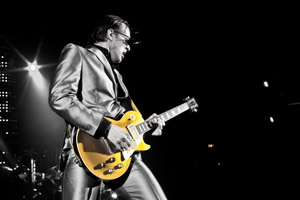
It was just one of those things; you don’t realise what you have until some foreigner re-sells it to you, aka the British came to America and sold us the blues in the 60s even though they had been gigging on for almost 60 years. There wasn’t a British blues scene happening in 2004. There were a lot of guys playing Strats in the Stevie Ray Vaughan fashion. I found myself on an island; but people in the UK were saying, ‘well, that’s kinda cool’, so that is part of my initial appeal.
“The blues has been written off almost every half decade; you could set your watch to it…”
“The blues has been written off almost every half decade; you could set your watch to it. If we all collectively said we’ll only play Mustang Sally, Redhouse, Sweet Home Chicago, then yes, it’s dead and it ain’t never coming back. But kids are now making it their own, and finding an audience of younger kids. That is the only way a genre of music survives; you find a younger generation of kids who are willing to invest in it and follow it. That’s all Clapton and those guys did; they amped it up and made it rock’n’roll. And Jimmy Page was taking Howlin’ Wolf songs and making them heavy metal. That’s how it works. Blues will never die if you take that attitude, although a lot of the time you’ll have to fight the purists on the way up: ‘That’s not the blues!’ Well, the new Ford is not a Model A, but it’s the same concept; it’s a horseless carriage. You have to modernise, people will not drive the same car as they did in 1925! They want an update to appeal to a broader audience.”
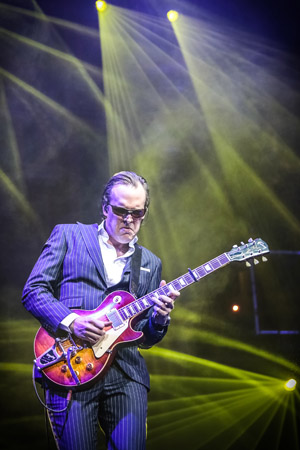
It’s his versatility and prolific (yet consistently high quality) approach that has also earned Joe his stripes, and the respect of a large legion of fans and admirers. At last count he’s made 16 albums (solo and otherwise) in the past eight years. “The tried and true methodology is you only serve one master (i.e. record company): you play that style of music, you only put out one style of record every five years, and if the radio stations embrace it again then it’s ‘we love you!’, and if they don’t dig it again then, ‘we’re really sorry!’ – that’s 25 years of sweat and toil, hard work, and ‘expert advice’ all gone tits up to the tune of ‘f*** off and have a nice day!’ That’s the problem. I’m a guitar player, not a blues player; I love all kinds of music, and luckily enough I have a fanbase that allows me to indulge in everything from classic rock’n’roll, to soul music with Beth Hart as singer (a recent blues and soul project of his that resulted in the album Seesaw), to instrumental jazz… it’s not for everybody.
“Some people go ‘great’, some go ‘just play Sloe Gin’. OK, fair enough; but other people dig those insights into your own personality. It’s been successful in allowing me to explore different types of music for my own personal reasons and also it makes the solo project stronger. A lot of them (the audience) look like me, like my father who listened to everything from James Taylor to Moby Grape; he had a very eclectic record collection. These are the same cats! My taste in music was fed by my father passing it down to me, and I look around, and they like the same stuff I listen to.”
This eclectic approach reached an apex recently with eight acoustic shows at the venerable Vienna Opera House last year, which were recorded and released as An Acoustic Evening At The Vienna Opera House. “They offered a gig, in the middle of the summer, when we were dormant – they only offer up the place to non-musicians like myself, people who can’t read music, for two weeks every year. So we’re like ‘we’ll take it’, and blagged our way into it! But we’re freaking out a little; you don’t want to go in there with electric guitars and a snare drum, that building is not made for that type of sound. It’s an acoustically efficient venue, so if you start hitting a snare you’re going to have a bad day! We decided to try and put together a band, a world band; a bit of Irish fiddle and nyckelharpa, a percussion player, all this different stuff. We learned the material and had just two days of rehearsals, and it worked great! We were literally unplugged, the only wires were into the mics. And I had to sing more; you don’t realise how much you solo until you take these long guitar solos out of the equation, and you think ‘My God! The ego on me!’
“Initially it was quite an adjustment for me, but once we got to the second or third show I realised this was really happening, and started having a great time. It is one of the things I’m most proud of.”
For his upcoming Brighton performance, expect to hear a mini-reprise of the Vienna concerts plus Bonamassa’s full electric show. www.jbonamassa.com
Saturday 28 September, Brighton Centre, SOLD OUT




















